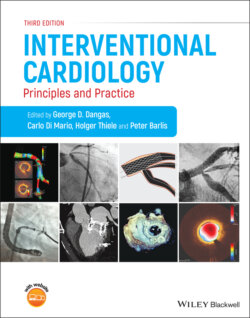Читать книгу Interventional Cardiology - Группа авторов - Страница 303
Parenteral antiplatelet therapy
ОглавлениеIntravenous (IV) antiplatelet medication include cangrelor and glycoprotein (GP) IIb/IIIa inhibitors. Cangrelor is a direct, quick onset and short acting IV P2Y12 inhibitor that was evaluated in the Cangrelor versus Standard Therapy to Achieve Optimal Management of Platelet Inhibition (CHAMPION) trials in ACS patients. A meta‐analysis of existing evidence published in 2013 reported fewer periprocedural ischemic complication at the cost of increased bleeding complications [53]. Moreover, the thrombotic benefit of cangrelor was attenuated in patients pretreated with clopidogrel during the CHAMPION PCI trial [54]. The most recent European guidelines give a class IIb recommendation for cangrelor administration only in P2Y12‐inhibitor naïve patients undergoing PCI [14]. Most of the evidence supporting GP IIb/ IIIa inhibitors (eptifibatide, or tirofiban) use in NSTE‐ACS patients was obtained in the era before routine use of DAPT. In a meta‐analysis by Boersma et al. GP IIb/ IIIa inhibitors were only beneficial in high risk patients with elevated troponin and in those who underwent revascularization within 30 days [55]. In a more contemporary setting, in the Early Glycoprotein IIb/IIIa Inhibition in Non–ST‐Segment Elevation Acute Coronary Syndrome (EARLY‐ACS) trial, routine upstream administration of eptifibatide did not benefit NSTE‐ACS patients, except patients at the highest risk for ischemic complications (such as those with troponin elevation, ST deviation, diabetes, recurrent ischemia) and low risk for bleeding (age <75 years). In addition, in the context of pre‐treatment with P2Y12 inhibitors, outcomes were favorable with use of bivalirudin alone versus unfractionated heparin and GPI during the Acute Catheterization and Urgent Intervention Triage Strategy (ACUITY) trial. As a result, GP IIa/ IIIa inhibitors are currently primarily used for thrombotic bail out [14].
